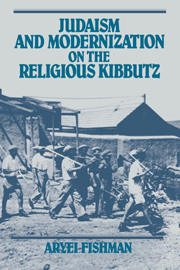Crossref Citations
This Book has been
cited by the following publications. This list is generated based on data provided by Crossref.
FISHMAN, Aryei
1995.
Modern Orthodox Judaism: A Study in Ambivalence.
Social Compass,
Vol. 42,
Issue. 1,
p.
89.
Katz, Yossi
1995.
The religious Kibbutz movement and its credo, 1935–48.
Middle Eastern Studies,
Vol. 31,
Issue. 2,
p.
253.
Kark, J D
Shemi, G
Friedlander, Y
Martin, O
Manor, O
and
Blondheim, S H
1996.
Does religious observance promote health? mortality in secular vs religious kibbutzim in Israel..
American Journal of Public Health,
Vol. 86,
Issue. 3,
p.
341.
Rosser, Marina V.
Barkley Rosser, J.
and
Kramer, Kirby L.
1999.
The new traditional economy.
International Journal of Social Economics,
Vol. 26,
Issue. 6,
p.
763.
Sosis, Richard
2000.
Religion and Intragroup Cooperation: Preliminary Results of a Comparative Analysis of Utopian Communities.
Cross-Cultural Research,
Vol. 34,
Issue. 1,
p.
70.
Sosis, Richard
and
Ruffle, Bradley J.
2003.
Religious Ritual and Cooperation: Testing for a Relationship on Israeli Religious and Secular Kibbutzim.
Current Anthropology,
Vol. 44,
Issue. 5,
p.
713.
Ichilov, Orit
2005.
Pride in One’s Country and Citizenship Orientations in a Divided Society: The Case of Israeli Palestinian Arab and Orthodox and Non‐Orthodox Jewish Israeli Youth.
Comparative Education Review,
Vol. 49,
Issue. 1,
p.
44.
Gal, Allon
2009.
Nations and their Histories.
p.
172.
Glucklich, Ariel
2011.
The Blackwell Companion to Religion and Violence.
p.
76.
Cahaner, Lee
and
Leon, Nissim
2013.
Returning to religious observance on Israel's non-religious kibbutzim.
Journal of Israeli History,
Vol. 32,
Issue. 2,
p.
197.
2016.
Generation im Übergang.
p.
452.
2016.
Generation im Übergang.
p.
180.
Casakin, Hernan
and
Reizer, Abira
2017.
Place attachment, residential satisfaction, and life satisfaction: Traditional and renewed kibbutz.
Journal of Human Behavior in the Social Environment,
Vol. 27,
Issue. 7,
p.
639.
Brody, Samuel Hayim
2019.
Political Economy as a Test of Modern Judaism.
Religions,
Vol. 10,
Issue. 2,
p.
78.
Mahla, Daniel
2020.
Orthodox Judaism and the Politics of Religion.
Kaye, Alexander
2022.
Religion, Law, and the Dynamics of Intellectual Transmission: Weimar Jurisprudence among Religious Socialists in Israel.
Law and History Review,
Vol. 40,
Issue. 2,
p.
305.
Sagi, Avi
2022.
“Religious-Zionism”: Signifier without Signified? Or—Is Religious-Zionism Still Alive?.
Religions,
Vol. 14,
Issue. 1,
p.
30.





